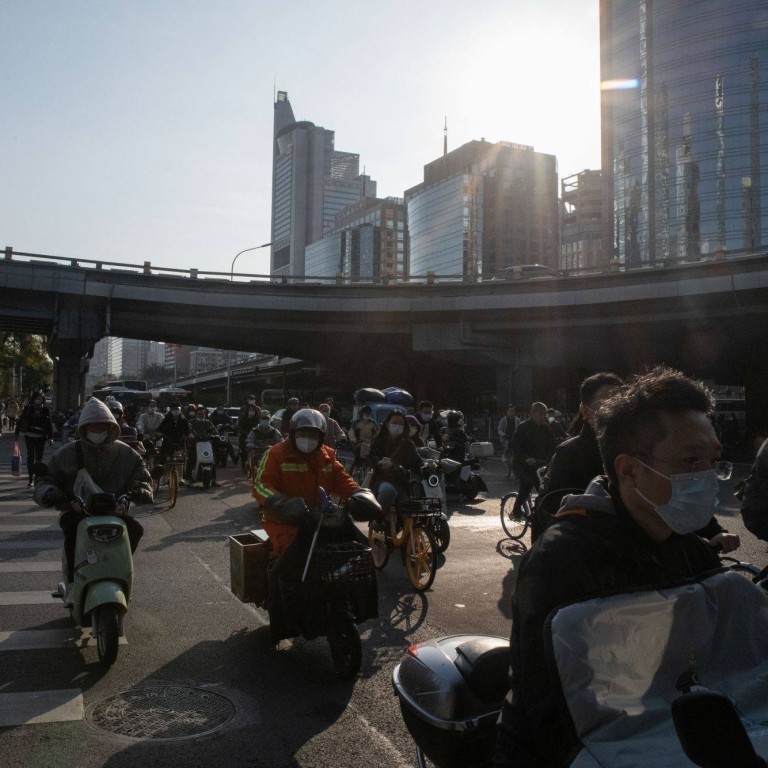
IMF urges China to ‘recalibrate’ coronavirus policy, aid vulnerable households amid shaky external environment
- The International Monetary Fund (IMF) says China should cut interest rates and ease strict coronavirus curbs for a much-needed economic recovery
- The IMF’s annual health check of the Chinese economy identified the Covid-19 pandemic, a slumping property market and external demand as major risks
China should consider cutting interest rates and offering more fiscal support to vulnerable households as the country needs a solid domestic recovery next year to offset a deteriorating external environment, a senior official with the International Monetary Fund (IMF) said on Wednesday.
The country also needs a “recalibration” of its zero-Covid strategy to bring the world’s second largest economy back on track, while relying on market reforms to raise productivity and deliver medium- and long-term growth, according to Gita Gopinath, first deputy managing director of the Washington-based organisation.
The suggestions come as the IMF makes public the results of its annual health check of the Chinese economy and financial system, which were made under the Article Four consultation mechanism in early November.
We see a role for long-term policy being accommodative, and that could come about through interest rate cuts
Unlike most other countries, however, China does not have an inflation problem, Gopinath told the Post in an interview on the publication of the Article Four review.
“Given that there is a need to bring about a stronger recovery in these next months, we see a role for long-term policy being accommodative, and that could come about through interest rate cuts,” she said.
“On fiscal policy, we see a need to have the support tilted towards helping vulnerable households … because that will help bring back private consumption.”
The IMF discussed its findings with senior Chinese government officials, the People’s Bank of China, private sector representatives and academics earlier this month.
Beijing is at an important juncture as most of the Communist Party’s new leadership line-up will be sworn into office in March, and there is some confusion over policies in the transitional period.
Frequent virus outbreaks and stringent coronavirus control measures are disrupting business and people’s mobility, and while the economy is slowing, the situation could deteriorate further due to lower external demand.
All eyes are now on December’s central economic work conference, in which China’s top leadership will discuss the 2023 growth target, as well as economic and coronavirus policies.
Liu Shijin, a central bank adviser, proposed a 2023 growth target of no less than 5 per cent at last week’s Caixin summit.
4 weaknesses in China’s economy highlighted by outgoing officials
Chinese authorities have spent a lot on infrastructure this year, but they have been cautious about large-scale monetary loosening. Instead, they have chosen credit and relending tools to support specific sectors, and in the past two weeks offered fresh financing help to property developers and small businesses.
The policy rate for the one-year medium-term lending facility has been slashed once this year, with a 10 basis points cut to 2.75 per cent in mid-August.
The five-year loan prime rate, a market benchmark linked to mortgage rates, has been lowered three times, with a total reduction of 35 basis points to 4.3 per cent.
“As we see it, this accommodative stance should continue with a greater reliance on cutting interest rates as opposed to channelling credit to help the economy,” Gopinath said.
If we don’t see an improvement in property sales or improvement in investment, then that’s another risk to the downside
The Chinese currency weakened to a near 14-year low of 7.2555 per US dollar in early November.
“We think that allowing flexibility in the exchange rate is a good way to deal with the spillovers because the fluctuation of the currencies is coming from differences in fundamentals,” she said.
“If we don’t see an improvement in property sales or improvement in investment, then that’s another risk to the downside that could then affect the broader economy more than it already is,” Gopinath added.
The IMF called for “neutral” fiscal policy, in contrast to Beijing’s proactive stance, to protect recovery and facilitate rebalancing. In particular, strengthening of the social safety net will help households and more effectively bolster growth, it said.
To tackle long-term headwinds, including an ageing population, shrinking workforce and low productivity growth, Gopinath said market-based structural reforms were needed. These included competitive neutrality between state-owned enterprises and private firms, as well as further investment in education and the postponement of China’s retirement age.
Gopinath said it would be helpful for Beijing to increase the rate of vaccination, especially among the elderly, if it really wants to strike a balance between economic growth and preserving lives and health.
While the central government has made attempts recently to optimise control measures, the country’s economic recovery has been only moderate, and China’s zero-Covid policy is still a major gripe among investors, small businesses and ordinary Chinese.
China wants to be a global talent hub, but what if they don’t want to come?
“This is one of the risks that we are still concerned about,” she said.
Goldman Sachs has forecast a gradual relaxation of the zero-Covid policy from the second quarter of next year, as newly promoted party members take on new roles.
The IMF based its 2023-24 growth projection for China of 4.4 per cent on the assumption that the zero-Covid policy will gradually be lifted in the second half of next year.
“We need to maintain vaccinations at a high level and deal with the cases that may come up by having sufficient antiviral medication to help, and having greater healthcare capacity,” Gopinath added.


